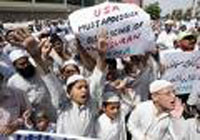Pakistani opposition waver on whether to boycott parliamentayr elections
Pakistani opposition hesitates whether to boycott the forthcoming parliamentary elections abandoning their intentions not to vote unless President Gen. Pervez Musharraf lifts the estate of emergency.

The government continued to roll back a wave of repression under the emergency rule, freeing several hundred more opponents across the country, as the president returned from a trip to Saudi Arabia to discuss the future of an exiled rival, Nawaz Sharif.
At home, former Prime Minister Benazir Bhutto deferred a decision on whether to spurn the election, which she had said in the past could not be considered legitimate so long as the emergency continued.
Musharraf has neutered the Supreme Court by removing independent-minded judges, muzzled the media by taking several private news channels off the air, and thrown thousands in jail.
But he has also vowed to step down as military chief - possibly in the next few days - and remain on as a civilian president, a crucial step that became easier after a newly constituted Supreme Court stacked with Musharraf loyalists declared him eligible Monday to serve as head of state. The court met again on Wednesday to consider whether emergency rule was legal.
Bhutto said late Tuesday that it would be a "good sign" if Musharraf quits his army post and rules as a civilian president, and avoided criticizing him directly. She said her party needed a few more days to decide whether to boycott the elections.
Meanwhile, a senior leader of a powerful religious alliance, the Muttahida Majlis-e-Amal or MMA, said his party was inclined to participate in the Jan. 8 vote, though he also called on Musharraf to lift the emergency. The comments by Maulana Fazlur Rehman were reported in the English-language Daily Times newspaper and the Urdu-language Jang newspaper.
Ameer-ul Azim, an MMA spokesman, told The Associated Press on Wednesday that no decision had been made on whether to participate in the vote.
Musharraf was flying back from Saudi Arabia early Wednesday after meeting with King Abdullah. Saudi officials said there were efforts to arrange a meeting between Musharraf and Sharif, who was ousted as prime minister by the general's 1999 coup. A Pakistani official said Musharraf's goal was to prevent Sharif from returning before the parliamentary elections.
On Wednesday, a senior member of Sharif's party said the ousted leader refused to meet with the general.
"He followed his commitment in letter and spirit of not holding negotiation with a military dictator," said party chairman Raja Zafarul Haq.
Haq declined to say whether his party would boycott the vote, saying the opposition ought to make a collective decision.
"If there is a decision to participate in the elections, all parties should participate. Otherwise all parties should boycott," he said.
Interior Ministry spokesman Javed Iqbal Cheema said Wednesday that more than 3,700 people had been released from lockup, several hundred more than he reported the day before. He said several new arrests were made, so he could not give an exact figure on how many people were still behind bars. Cheema had put the figure of those still in detention at 2,000 on Tuesday.
Many high-ranking party activists and leaders, such as former cricket star turned politician Imran Khan and Aitzaz Ahsan, president of the Supreme Court Bar Association, remained in prison. Khan began a hunger strike Monday to protest emergency rule.
The government did not say what prompted the mass release, but it came just days after a visit by U.S. Deputy Secretary of State John Negroponte, who issued a blunt call for Musharraf to end emergency rule.
While Washington remains Musharraf's key backer, providing billions of dollars in aid in return for Pakistan's help against al-Qaida and the Taliban, Saudi Arabia 's own aid and investment give it considerable influence.
Saudis, including among the royal family, have for years funded fundamentalist Sunni Muslim clerics and schools, giving the kingdom sway among Pakistan 's powerful Islamic movements.
Musharraf spent hours discussing topics including countering Islamic extremism with Saudi security officials before meeting with Saudi King Abdullah.
Details of that meeting were not available, but an official in Musharraf's office in Islamabad said Saudi leaders wanted the general to let Sharif return and compete in next month's elections.
Musharraf, the official said, was seeking to convince Saudi Arabia that having Sharif return now would deepen the political turmoil and threaten Pakistan 's stability.
The official said Musharraf has privately told aides that he would be prepared to let Sharif return after the January election provided he tones down his rhetoric.
Both the Saudi and Pakistani officials spoke on condition of anonymity because of the sensitivity of the issue.
Subscribe to Pravda.Ru Telegram channel, Facebook, RSS!


